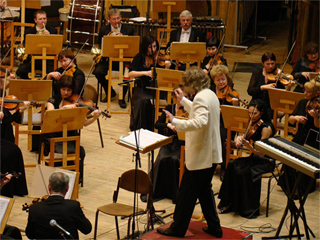 by Jane Owen, AFM Symphonic Services Division Negotiator
by Jane Owen, AFM Symphonic Services Division Negotiator
The new collective bargaining agreement (CBA) has been agreed upon and ratified. The revised document has been proofread and signed and the ink has barely dried. Now the musicians of the orchestra, and especially the orchestra committee, get to breathe a sigh of relief and go back to practicing, playing concerts, and living their lives, right? Well, yes, and no.
Right away work begins for the orchestra committee to start preparations for the next negotiation. There should be a strong committee in place every season, but it is especially important during the first year of an agreement when the musicians and management have new working conditions to implement. It is recommended that committee member terms be staggered two-year periods to provide continuity of experienced members on the committee. Some orchestras have separate committees: one to negotiate and one to handle the day-to-day business of the orchestra. It is important that these two committees communicate throughout and after the negotiation. Also, a member of the committee during the negotiation should continue on to the orchestra committee when the new agreement begins, if possible.
The orchestra committee must document all problems that come up during the term of the new CBA, whether grieved or not, and the results of dealing with those problems. It can be helpful to keep a copy of the CBA with notes about these issues to review for the next set of negotiations. If a resolution or grievance results in new language, that language must be saved with the CBA to be included in the new agreement when future negotiations occur.
If the CBA provides for musician representatives to the orchestra board of directors or artistic advisory committees that meet with management, the orchestra committee must establish clear lines of communication with those representatives. Interactions between any of these representatives and management should be coordinated through the orchestra committee to avoid confusion about issues governed by the CBA. All these representatives must be aware of their responsibilities and the extent of their authority, if any. Musician representatives to the board and artistic advisory committees can be extremely useful for communication with management and the board, but the orchestra committee and the union are the only musician representatives able to allow waivers to clauses in the CBA or negotiate items not covered by it.
It is important that the musician representative(s) to the board report back to the orchestra committee and the orchestra as a whole, if necessary, any pertinent information they receive at board meetings. They should periodically receive financial statements, which can be analyzed as the seasons progress to be aware of any problems that may be brewing, or conversely, good news that is happening. (For example, if ticket sales are flourishing or the recent gala was a great success.) It’s best to gather information along the way and avoid being surprised by good or bad financial news when preparations for negotiations start in earnest.
If your orchestra hasn’t yet done so, start a “musicians of” website, Facebook page, and Twitter account. Start an email newsletter. Use social media to present positive information about the orchestra and musician community involvement. Our communities often don’t know that this is how we make our living. There is little awareness of the number of concerts we play in schools, churches, adjoining neighborhoods, or other venues. Help spread the news! These are great resources to build and identify your fan base and supporters, if you face a troublesome negotiation along the way. Once again, of course, the orchestra committee needs to monitor what information goes out via these outlets before it is posted. This ensures that the musicians are always portrayed in the best way possible.
The orchestra committee can also work with the local union to encourage musician participation in local activities. Are orchestra members on the local’s board or do any act as local officers? Are there regular meetings that orchestra members could attend? The time between negotiations is a good opportunity to strengthen the connection between musicians, their local, and area labor groups and to seek out available resources should they be needed. AFM orchestra conferences, ICSOM and ROPA, provide valuable information and support. Through their conference delegate, the committee can maximize those resources as well.
Finally, communication is key. Be sure that orchestra musicians know who is on their orchestra committee and who their local representatives are. Distribute contact information for these representatives at the beginning of the season. Establish how and when all committees and representatives will communicate with each other and the orchestra as a whole. This is all hard work, but well worth it when you are gathering the forces and the information you need to negotiate your next CBA.




